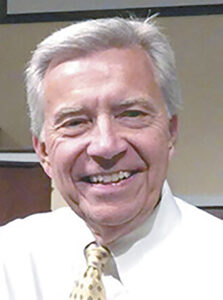By Mike Dawson
Pastor Emeritus, First Baptist Church, Columbia
Focal Passage: Colossians 2:16-23
 I heard a pastor speak about the importance of preaching Biblical, doctrinal truth. He described a little mountain church where one lady came to the visiting minister after service and said, “That was a sweet sermon, preacher — there weren’t no doctrine in it, nor nothin’! ” Well, I pity the congregation where that could truthfully be said of any sermon, don’t you? There’s one preacher who’d never be described like that, the Apostle Paul. He clearly showed how he dealt with doctrine in today’s text, Colossians 2:16-23.
I heard a pastor speak about the importance of preaching Biblical, doctrinal truth. He described a little mountain church where one lady came to the visiting minister after service and said, “That was a sweet sermon, preacher — there weren’t no doctrine in it, nor nothin’! ” Well, I pity the congregation where that could truthfully be said of any sermon, don’t you? There’s one preacher who’d never be described like that, the Apostle Paul. He clearly showed how he dealt with doctrine in today’s text, Colossians 2:16-23.
These verses show Paul confronting three doctrinal errors that had infiltrated the church in Colossae: legalism (verses 16-17), mysticism (verses 18-19) and asceticism (verses 20-23). Paul saw these errors endangering the Colossian believers, and they endanger believers today.
• The error of legalism. In verses 16-17, Paul urged the brothers and sisters to beware of those who would try to box them in with rituals and human traditions. Meat and drink had to do with the Jewish dietary laws. Festival, new moon, and Sabbath referred to the yearly, monthly, and weekly observances practiced in Old Testament days.
There’s certainly nothing wrong with observing certain traditional days or having dietary restrictions for religious purposes. But when we begin to condemn and judge others who don’t observe traditions just the way we do, we deny them their freedom in Christ.
Paul told the Colossian Christians that such rituals were only a shadow of things to come. They were like a photograph that could not (and should not) be substituted for the real thing. Christ might be pictured in some rituals, but how much better to see Him in person!
• The error of mysticism. It’s good to be at one with God. In fact, the mystery of “Christ in you, the hope of glory” that Paul revealed in Colossians 1 is one of the great truths of the Gospel. The Christian life calls for a measure of mysticism. But claiming to be so much in tune and at one with God that we become conceited and look down on others, as some were doing in Colossae (verses 18-19), is dangerously false teaching. As the body of Christ, everything flows from Him, our Head — and if we worship angels, ourselves, or anything else, we are puffed up Paul says, and full of pride.
• The error of asceticism. There were teachers in Colossae who called the hermit-type life the right life. They falsely claimed that they had no desire for food or any other physical cravings, therefore they were more spiritual than others (verses 20-23). Vance Havner commented on this pious attitude by saying, “Going into a hole doesn’t make somebody holy.” Acting like the physical world doesn’t exist doesn’t keep it from existing, and that’s what those false teachers were doing.
What is the answer? It’s knowing that Christ-followers died with Christ, as Paul said in verse 20. Remember that Paul had testified in Galatians 2:20, “I have been crucified with Christ.”
Through Christ’s atoning death for our sins, we died too — and therefore we live, but not us — it’s Christ in us (the hope of glory)! We died with Him and He lives in us, therefore we can be victorious over false doctrines like these. B&R — Dawson is pastor emeritus at First Baptist Church, Columbia, and also serves as transitional interim around the state.

